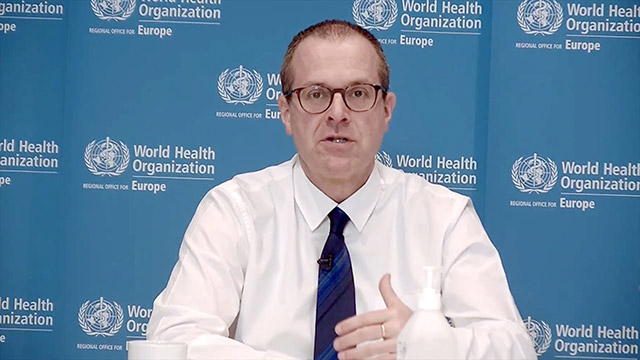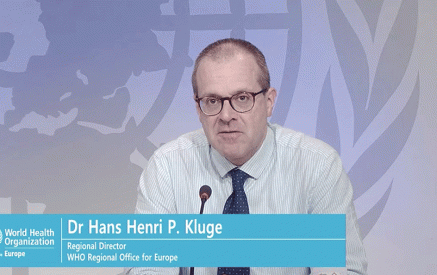COVID-19 statement by WHO Regional Director for Europe, Dr Hans Henri P. Kluge
Last month, we alerted that a further half a million lives could be lost by early 2022 unless we take urgent action. We called upon governments and people to take immediate steps to bring transmission down, by implementing five pandemic stabilizers.
A month has passed and a further 120,000 people have died, and the region has added another 10 million COVID-19 cases to its tally. By the end of this week, 1 in 10 people across the European Region will have had a COVID-19 infection, confirmed by laboratory testing.
While the end of the year and the festive season is approaching, reported deaths due to COVID-19 have reached a high plateau, close to 4,100 deaths per day, doubling from 2,100 deaths per day at the end of September 2021, and cumulative reported deaths from COVID-19 passed 1.5 million for the 53 countries in our Region just two weeks ago.
Read also
Case notification rates have increased across all age groups, with the highest rates currently observed in those aged 5-14 years.
While cases and deaths have more than doubled in the past two months, COVID-19 deaths have remained significantly below previous peaks. Thus, the mortality would have been far worse without vaccination.
55% of all Europeans are fully vaccinated and 43 out of 53 countries now offer an additional/booster dose to their most vulnerable populations.
Research conducted by WHO/Europe and the European Centre for Disease Prevention and Control has found that from December 2020 to November 2021, at least 469,186 lives were directly saved through COVID-19 vaccination.
This is an overwhelming affirmation of the value of vaccines and science, a testimony to government and healthcare worker commitment and most of all a great recognition of the public’s acceptance and support to tackling this pandemic.
The Delta variant remains dominant across Europe and Central Asia, and we know that the COVID-19 vaccines remain effective in reducing severe disease and deaths from it. It is yet to be seen how and whether the latest COVID-19 variant of concern, Omicron, will be more transmissible, or more or less severe. Information available on the variant is preliminary and evolving, including how effective our countermeasures are, including our vaccines, diagnostics and therapeutics.
This brings me to my triple call today:
To shift from a reactive mode to stabilize the crisis;
To protect children and their schools as part of the response strategy;
Not to make vaccines mandatory without reaching out to communities first.
The first call is that we need to shift from ‘reaction’ to ‘stabilization’ mode in this crisis. There are five pandemic stabilizers to keep mortality down:
Increasing vaccine uptake,
Administering additional or third doses,
Doubling the rate of mask-wearing indoors,
Ventilating crowded spaces,
Adopting rigorous therapeutic protocols for severe cases.
The second point is to create COVID-safe learning for young children so that we can avoid school closures and home-learning.
It is not unusual today to see 2 to 3 times higher incidence among young children than in the rest of the population. The health risks extend beyond the children themselves. As school holidays approach, we must also acknowledge that children can infect their parents and grandparents at home, with a tenfold increased risk for these adults to develop severe disease, be hospitalized or die if non-vaccinated.
The use of masks and ventilation, and regular testing, should be a standard at all primary schools and vaccinating children should be discussed and considered nationally, as part of school protection measures. Vaccination of younger children not only reduces their role in COVID-19 transmission but also protects them from pediatric severity, whether associated with long-COVID or Multi-System Inflammatory Syndromes.
Finally, my third call is to not mandate vaccination if you haven’t reached out to the communities first.
Mandates around vaccination are an absolute last resort and only applicable when all feasible options to improve vaccination uptake have been exhausted. They have proven effective in some environments, to increase vaccine uptake. But the effectiveness of mandates is very context-specific. The effect that mandating vaccination could have on public confidence and public trust, as well as vaccination uptake, must be considered. What is acceptable in one society and community may not be effective and acceptable in another. Mandates must be supported by appropriate policy considerations, a comprehensive implementation plan, including provisions for exemptions, and a strong communications component for the population. Ultimately, mandates should never contribute to increasing social inequalities in access to health and social services.
Any measure that may restrict a right or movement of a person, such as lockdowns or mandates, also needs to assure that mental health and wellbeing is cared for, that a means of prevention/early detection and management of domestic violence are in place, and that economic support is available to those most affected.
So, be it point one, stabilization of COVID-19, two, safe schooling, or three, dialogue on mandates and other public health and social measures, dialogue with communities needs to remain the cornerstone of our response.
Omicron is in sight and on the rise and we are right to be concerned and cautious. But, as I said, the problem now is Delta and however we succeed against Delta today is a win over Omicron tomorrow.
We are in the business of stabilizing a pandemic, and that means not one variant at a time but all variants, at once.
Thank you.























































